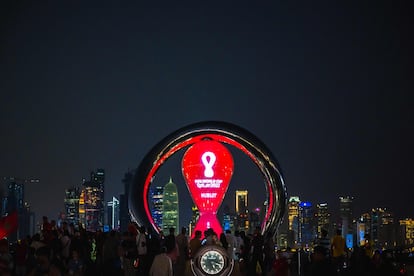Qatar attempts to nip image problems surrounding World Cup beer stands in the bud
Tournament organizers have got cold feet about the proximity of Budweiser-branded sales points to stadiums and have ordered them moved out of sight


With less than a week until the World Cup kicks off in Qatar – and shortly before the arrival of over a million soccer fans in a country of 2.7 million inhabitants with an overall size of slightly less than Connecticut – problems have started to arise for the tournament organizers. The Supreme Committee for Delivery & Legacy (SC), under pressure from FIFA – which is itself under pressure from its sponsors – agreed to permit the consumption of alcohol for the duration of the tournament, despite Qatar practicing Sharia law. The conditions are quite clear, as explained to EL PAÍS by Fatma al Nuaimi, communications executive director at the SC: fans can drink alcohol from three hours before a match and for one hour after the game has finished in designated areas. There will also be a specific zone set aside for people to recover from the effects of alcohol, and others areas designed to accommodate supporters from the surrounding region who wish to “enjoy the experience as a family.”
But the World Cup organizers are starting to get cold feet after seeing the first beer tents being set up and on Saturday told Budweiser, a major tournament sponsor, that they had to be relocated to less visible areas in the environs of the eight host stadiums where the 64 games will be staged. The New York Times, which cited sources saying that the order had come from within the Qatari royal family, published a video on Monday of workers moving the Budweiser-branded beer stands from their original locations.
Workers at a World Cup stadium hustling over the weekend to move a beer tent after an edict from Qatar hide sales points to less visible locations around all 8 stadiums amid claims of safety fears. pic.twitter.com/FSnT73JYrj
— tariq panja (@tariqpanja) November 14, 2022
Asked about the sudden change of stance on the proximity of alcohol to the stadiums, the SC issued a cryptic statement that made no explicit mention of the beer stands: “With six days to go before the start of the Qatar 2022 World Cup, operational plans are being finalized as we prepare to host the world. These plans involve management teams enhancing the requirements for all competition venues. This has a direct impact on the location of certain fan areas. Pouring times and the number of pouring destinations remain the same at all eight World Cup stadiums.”
Qatar’s penal code, which the country has agreed to ignore if such cases arise during the tournament, establishes fines of up to $800 and prison terms of up to six months for anyone drinking alcohol in a public place or found to be drunk and disturbing others. Before the World Cup, alcohol was available to foreigners in some hotels and restaurants, where a beer costs an average of $12. There is only one place in the entire country where alcohol can be purchased off-premises, and it is owned by Qatar Airways. Located on the outskirts of Doha, it is not accessible to everyone. To be able to buy alcohol there, customers must present a letter from their company expressly authorizing them to drink, and they also have to show a payslip, because it is only permitted to buy amounts according to a percentage of salary.
A former Spanish diplomat recalls that the place was so seedy that he felt like he “was buying crack” instead of wine or beer. It is also forbidden to bring alcohol into the country. If a tourist is carrying a bottle in their luggage it will be confiscated, although it will be returned when leaving Qatar, according to several foreign visitors who have tried to do so.
Tu suscripción se está usando en otro dispositivo
¿Quieres añadir otro usuario a tu suscripción?
Si continúas leyendo en este dispositivo, no se podrá leer en el otro.
FlechaTu suscripción se está usando en otro dispositivo y solo puedes acceder a EL PAÍS desde un dispositivo a la vez.
Si quieres compartir tu cuenta, cambia tu suscripción a la modalidad Premium, así podrás añadir otro usuario. Cada uno accederá con su propia cuenta de email, lo que os permitirá personalizar vuestra experiencia en EL PAÍS.
¿Tienes una suscripción de empresa? Accede aquí para contratar más cuentas.
En el caso de no saber quién está usando tu cuenta, te recomendamos cambiar tu contraseña aquí.
Si decides continuar compartiendo tu cuenta, este mensaje se mostrará en tu dispositivo y en el de la otra persona que está usando tu cuenta de forma indefinida, afectando a tu experiencia de lectura. Puedes consultar aquí los términos y condiciones de la suscripción digital.








































